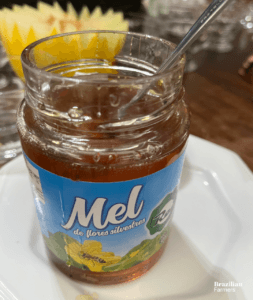 Bees are the most important group of pollinators, crucial for maintaining biodiversity and ensuring the production of nutritious food. Last Thursday (May 18), at the CNA headquarters in Brasília, this theme was analyzed by experts at a seminar organized by the CNA/SENAR System, with the support of the Embassy of Israel in Brazil. The meeting marked the celebration of World Bee Day, on May 20. Researchers, farmers, and technicians could exchange information about technologies and trends related to beekeeping and pollination.
Bees are the most important group of pollinators, crucial for maintaining biodiversity and ensuring the production of nutritious food. Last Thursday (May 18), at the CNA headquarters in Brasília, this theme was analyzed by experts at a seminar organized by the CNA/SENAR System, with the support of the Embassy of Israel in Brazil. The meeting marked the celebration of World Bee Day, on May 20. Researchers, farmers, and technicians could exchange information about technologies and trends related to beekeeping and pollination.
In the first panel, the Representative of FAO in Brazil, Marcello Broggio, highlighted that bees and other pollinators are essential for ecosystem health and beneficial for agriculture and the environment. Broggio drew attention to the challenge of sustainability for many beekeeping activities worldwide due to rising production costs.
According to him, agriculture cannot thrive and some crops cannot exist without the pollination process: “Pollinators need a suitable environment to thrive and fertilize plants.” Broggio received a letter from young Miguel, son of producer Eveline Amélia Soares, from the Bee Walker Project, which aims to integrate bees into soybean production.

The subject was the topic of the following debate, in which the researcher from EMBRAPA Soy, Décio Gazzoni, discussed how the integration between bees and soybean production can be a win-win strategy for both parties. He stated that EMBRAPA has investigated that relationship in recent years and concluded that, despite soybean being self-pollinating, it benefits from insect pollination, especially from bees.
“We have identified more than 40 species that visit soybean crops, and the honey bee (Apis mellifera) is the most common. Soybean flowering lasts about three weeks, maybe more, and during this period, there will be around 60 million flowers per hectare. If the bees collect nectar from each of these flowers at least once, we will have almost 25 liters of nectar per hectare. With the work of bees, the number of grains per pod is higher.”
The second panel discussed the actions of the CNA/SENAR System for the beekeeping sector. Rafael Costa, a technical advisor from the National Rural Apprenticeship Service, stated that beekeeping is a relevant activity that has been expanding in Technical and Managerial Assistance (ATeG) provided by SENAR, especially as an alternative to poverty. “SENAR works with family farmers, who create jobs and see beekeeping as an income-generating option.”
Rafael explained the program that attends more than 9.9 thousand beekeepers, producing 1.7 thousand tons of honey per year and yielding an annual revenue of R$32 million. “Beekeeping is a profitable activity, but it faces some challenges in operation, management, product registration, and services.”
The SENAR technical advisor Vilton de Assis mentioned that beekeeping is among the top five priority themes for Rural Professional Training. In 2022, more than 20 thousand people took part in the program, which includes courses, training, seminars, and workshops. “Our actions encompass basic, intermediate, and advanced beekeeping, apiary establishment, management and planning, bee feeding, pollen production, royal jelly, and propolis, among others.”
Felipe Spaniol, the Trade Intelligence Coordinator at CNA, lectured about the entity’s role in promoting trade intelligence and advocating the interests of priority productive chains, including beekeeping. He used as an example the Agro.BR project, which currently has 147 registered companies in the honey, propolis, and bee products sectors.

“Technologies and trends related to beekeeping and pollination” was the theme of the third panel, featuring rural producer Tom Prado. He talked about Itaueira, a company that produces fruits (melon, grape, and watermelon), bell peppers, and honey in the states of Bahia, Piauí, and Ceará, and the benefits of bee pollination in fruit farming.
Tom highlighted some challenges of honeybee pollination in melons and watermelons the company produces, including dealing with droughts (lack of flowering), ensuring bee health and safety (varroa mites and natural enemies), and maintaining strong colonies throughout the year.
Next, representatives from Israeli companies Beehero, Bloom, and To Bee lectured on technologies deployed in honey production. Beehero mentioned precision pollination, using a sensor that collects hive data, like an intelligent box, to reduce bee mortality and costs, and improve honey production. Bloom talked about an algorithmic tool that predicts when and how bee pollination will occur, aiming to increase pollen scale and help control the entire process, similar to machines. To Bee presented an electric system to eradicate mites in a hive within 15 days. The treatment has 95% effectiveness and leaves no residues in honey.
To conclude the debate, beekeeper Aldo Machado dos Santos shared his experience with bee and soybean production. “In our region, in São Gabriel (Rio Grande do Sul state), we started to notice that the beehives located near soybean crops fared better than the others.”
He emphasized the need for planning and implementing the best colony management strategies based on flowering seasons and improving beekeeping activities and productivity. “With training and technical knowledge for beekeepers and dialogue with farmers, Brazil will have the ability to become one of the world’s leading honey producers,” he concluded.